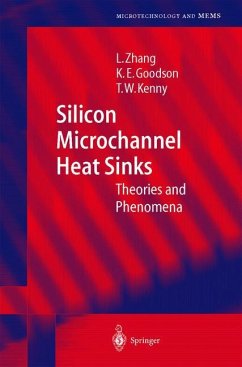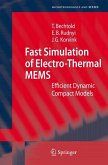Two-phase microchannel cooling is one of the most promising thermal-management technologies for future high-power IC chips. Understanding the boiling process and the two-phase-flow behavior in microchannels is the key to successful implementation of a microchannel heat sink. This book focuses on the phase-change phenomena and the heat transfer in sub-150 nm diameter silicon microchannels, with emphasis on thermal measurement and modeling, and the impact of small dimensions on two-phase flow regimes.
There is significant current interest in new technologies for IC (Integrated Circuit) cooling, driven by the rapid increase in power densities in ICs and the trend towards high-density electronic packaging for applications throughout civilian and military markets. In accordance with Moore's Law, the number of transistors on 6 Intel Pentium microprocessors has increased from 7.5 x10 in 1997 (Pentium II) to 6 55 x10 in 2002 (Pentium 4). Considering the rapid increase in the integration density, thermal management must be well designed to ensure proper functionality of these high-speed, high-power chips. Forced air convection has been traditionally used to remove the heat through a finned heat sink and fan module. 2 Currently, with 82 W power dissipation rate, approximately 62 W/cm heat flux, from a Pentium 4 processor with 3.06 GHz core frequency, the noise generated from high rotating speed fans is approaching the limit of acceptable level for humans. However, the power dissipation from a single cost-performance chip is 2 expected to exceed 100 W/cm by the year 2005, when the air cooling has to be replaced by new cooling technologies. Among alternative cooling methods, the two-phase microchannel heat sink is one of the most promising solutions. Understanding the boiling process and the two-phase flow behavior in microchannels is the key to successful implementation of such a device.
Hinweis: Dieser Artikel kann nur an eine deutsche Lieferadresse ausgeliefert werden.
There is significant current interest in new technologies for IC (Integrated Circuit) cooling, driven by the rapid increase in power densities in ICs and the trend towards high-density electronic packaging for applications throughout civilian and military markets. In accordance with Moore's Law, the number of transistors on 6 Intel Pentium microprocessors has increased from 7.5 x10 in 1997 (Pentium II) to 6 55 x10 in 2002 (Pentium 4). Considering the rapid increase in the integration density, thermal management must be well designed to ensure proper functionality of these high-speed, high-power chips. Forced air convection has been traditionally used to remove the heat through a finned heat sink and fan module. 2 Currently, with 82 W power dissipation rate, approximately 62 W/cm heat flux, from a Pentium 4 processor with 3.06 GHz core frequency, the noise generated from high rotating speed fans is approaching the limit of acceptable level for humans. However, the power dissipation from a single cost-performance chip is 2 expected to exceed 100 W/cm by the year 2005, when the air cooling has to be replaced by new cooling technologies. Among alternative cooling methods, the two-phase microchannel heat sink is one of the most promising solutions. Understanding the boiling process and the two-phase flow behavior in microchannels is the key to successful implementation of such a device.
Hinweis: Dieser Artikel kann nur an eine deutsche Lieferadresse ausgeliefert werden.








